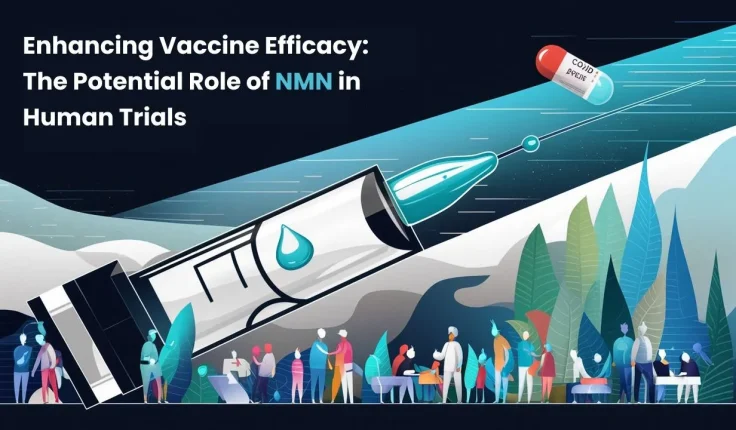Enhancing Vaccine Efficacy: The Potential Role of NMN in Human Trials
0 Views

Vaccination is a cornerstone of public health, relying on the body’s ability to mount a strong and lasting immune response. Nicotinamide Mononucleotide (NMN), a precursor to NAD+ (Nicotinamide Adenine Dinucleotide), has emerged as a promising compound that may enhance vaccine efficacy by supporting immune function. This article explores how NMN could play a significant role in human vaccine trials, offering a scientific perspective on its potential benefits.
The Need for Strong Immune Responses
For vaccines to be effective, they must stimulate a robust immune response that leads to the production of antibodies and immune memory. However, factors such as aging, stress, and metabolic disorders can weaken the immune system, making it harder for the body to respond effectively to vaccines. Enhancing immune function in these populations is critical, and NMN may offer a way to achieve this.
How NMN Supports Immune Function
NMN boosts NAD+ levels, which are essential for the energy production and maintenance of healthy immune cells. Here’s how NMN may enhance immune responses:
- T Cell Activation and Function: T cells are vital for the immune response, attacking infected cells and helping to produce antibodies. NMN supports the energy needs of T cells, ensuring they remain effective during vaccination.
- Regulating Inflammatory Responses: While inflammation is a natural part of the immune response, excessive inflammation can be harmful. NMN helps regulate inflammation by supporting NAD+-dependent enzymes that modulate inflammatory pathways, ensuring a balanced immune response.
- Protecting Against Oxidative Stress: Immune cells are vulnerable to oxidative stress, which can impair their function. NMN, by increasing NAD+ levels, enhances the activity of antioxidant enzymes that protect immune cells from damage.NMN in Human Vaccine Studies
Emerging research suggests that NMN supplementation could enhance the efficacy of vaccines, particularly in populations with weakened immune systems. Some key areas of interest include:
- Improving Vaccine Outcomes in the Elderly: Aging is associated with a decline in NAD+ levels and immune function, which can lead to weaker vaccine responses. NMN supplementation has been shown to increase NAD+ levels in older adults, potentially improving their immune response to vaccines.
- Broad Applications for Immunization: While current research is still developing, the potential for NMN to improve immune responses could extend to various vaccines. This could be particularly important for addressing new infectious diseases, where strong immune responses are crucial.
Practical Use of NMN for Vaccination Support
For those considering NMN supplementation to support vaccine responses, it’s essential to consult with healthcare professionals. NMN is generally safe, but its effects on vaccination efficacy are still under investigation. Proper guidance on NMN dosage and monitoring can help optimize the benefits of NMN in conjunction with vaccines.
Final Considerations
NMN holds promise as a supportive agent in enhancing vaccine efficacy, particularly for individuals at risk of reduced immune function. By boosting NAD+ levels, NMN can support key immune processes, potentially leading to stronger and more effective vaccine responses. As research continues, NMN could become an important tool in improving public health outcomes through better immunization strategies.
- TAGS :
Related Posts

What Are the Benefits of Visiting an Ear Suction Clinic for Ear Wax Microsuction?
Andrin Andrin / January 10, 2025












